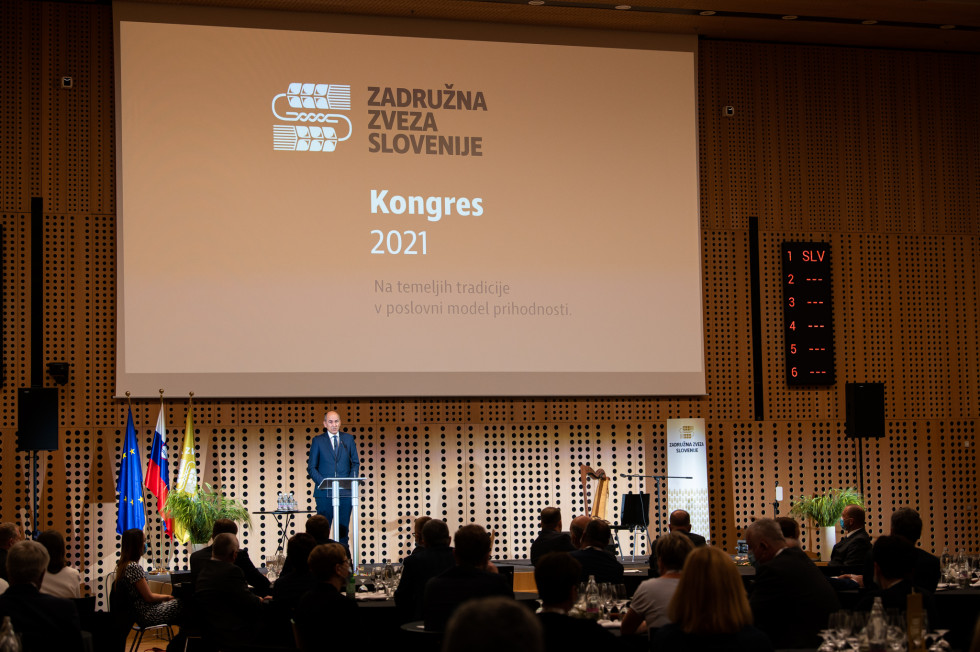By: UKOM
Prime Minister Janez Janša attended yesterday’s opening ceremony of the Cooperative Union of Slovenia congress entitled “Na temeljih tradicije v poslovni model prihodnosti” (Developing a Business Model of the Future Based on Tradition), addressing the decision-makers in Slovenian cooperatives.
In his speech, the Prime Minister highlighted the importance of cooperatives in Slovenia, where they have been operating for 150 years now. As their umbrella organisation, the Cooperative Union of Slovenia brings together 60 agricultural and forestry cooperatives, which employ 2,600 people and connect over 13,000 farmers. “150 years is a long time, in which many things can happen: many things come to life and die, they emerge and disappear.” According to the Prime Minister, this means that Slovenian cooperatives formed on realistic bases and that they were organised around realistic needs, which is why they still exist today.
He continued by discussing the past year, which has been marked by the novel coronavirus epidemic. Many countries had great problems obtaining various raw materials, including food. “During the epidemic we were aware that food is not a product that is always available, but that it is the most strategic raw material.” In his opinion, cooperatives thus constitute a strategic activity.
In this regard, he drew attention to the fact that since last spring a discussion on strategic autonomy has been taking place within the European Union, which also involves a discussion on the European agricultural policy. The founding fathers of the European Union recognised the importance of food, agriculture and self-sufficiency. Their policy is one of the pillars of a united Europe, which ensured that after the Second World War Europe did not starve and that more food was produced than consumed. As the Prime Minister pointed out, however, the Common Agricultural Policy also caused certain problems. Not everyone that produces food in Europe is in an equal position. There are various mechanisms that thus seek to equalise things, but they have not been sufficiently worked out and so there is still a great deal to be done in this area. There are also imbalances in the food production and distribution chain, which is also highlighted time and again by the Minister of Agriculture when the government is adopting various measures. The Prime Minister added that it is not always possible to find an easy answer to this, because it involves two conflicting principles: the principle of the market economy and that of strategic importance. Because Slovenia is part of the European Single Market and the Common Agricultural Policy, seeking a balance between the two principles is the more difficult.
“Cooperatives do a great deal to make this problem easier to solve.” Agricultural and forestry cooperatives ensure food safety and purchase 80% of all food produced at farms in Slovenia. The future business model, which includes introducing new technologies, digitalisation and smart villages, can also provide a solution to these challenges. In this regard, the Prime Minister said he was glad to see that cooperative members are beginning to recognise this opportunity, and that consequently he was personally not worried about the future of Slovenian farmers. “In Slovenian history, farmers have always managed to use common sense to overcome the most difficult times.”
This year we are celebrating 30 years of Slovenia’s independence. Already at the very start, Slovenian farmers were the ones who paved the way for Slovenia’s democratisation through their bold actions at the Union Hall, Cankar Centre and Congress Square and the establishment of the first independent political organisation, the Slovenian Farmers’ Alliance. Only when this way was paved were the conditions created for Slovenia’s independence. In this connection, the Prime Minister mentioned Ivan Oman, Ivan Pučnik and Franc Zagožen, who recognised not only the importance of their profession and mission, but also the importance of the broader situation and free democratic life, which makes it possible for a fair day’s work to receive a fair day’s pay.
The Prime Minister believes the situation is similar even after thirty years. The Slovenian countryside and Slovenian farmers are part of a healthy political Slovenia, which is aware that money does not grow on trees. That great effort is required to produce something. That the problem is not only how to divide what has been harvested, but that first something needs to be grown, which requires courage, perseverance and patience. Moreover, it is the producers who must also have the biggest say in how to divide what has been grown. The Prime Minister believes this spirit has pervaded Slovenian cooperatives since the very beginning.
He concluded his speech by wishing the members of Slovenian cooperatives successful work at the congress, and a great deal of courage, optimism and confidence in building new business models, which have already begun to take shape, and that the cooperatives have boldly included in their programmes, operations and training. “This approach is going to produce even better results.” The Prime Minister added that the draft Cooperatives Act prepared in cooperation with the Cooperative Union of Slovenia is currently being discussed in the Parliament, and that he was confident that the new legal basis would lead to a further step forward in the development.
Source: gov.si

